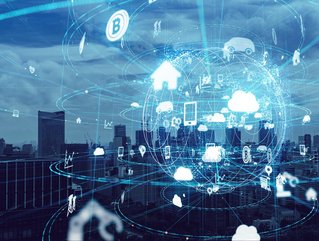Where Can Intelligent IoT Take Your Business in 2022?

In a domestic scenario, artificial intelligence (AI) is probably still the stuff of sci-fi TV even though many users of Alexa or Siri will be blissfully unaware that both ‘assistants’ are very real applications of AI. The world of AI does indeed cover a vast range of applications. Everything from the aforementioned digital assistants that have become commonplace in our homes through to temperature sensors on large-scale farms are examples of AI at work.
And whilst AI will continue to drive technological innovation around the home, it is perhaps within industrial applications that we will reap greater benefits. Enterprise-level AI is already making itself at home forming a critical part of the technology stack in a diverse range of industries. AI largely serves the business world via its capacity to provide a wealth of meaningful data that allow companies to make informed decisions regarding the future.
Another powerful technology, closely allied to AI, is the Internet of Things (IoT). Indeed, some people refer to the combination of AI and IoT as the artificial intelligence of things or AIoT. In this relationship, think of AI as the control centre or brain, and IoT as some kind of nervous system - a system made up of nodes or data points. And this is where businesses ultimately reap value from such technology - when organisations treat every single internet connection as a point to pull data from for further analysis, then they can start to accumulate relevant information that drives meaningful action. This data can come from cameras, microphones, thermometers, any kind of sensor and even people.
Analysts are generally bullish when it comes to the global market for artificial intelligence in IoT. Conservative estimates point to a value of over $20 billion over the next 5 years. A very compelling opportunity for businesses then. Where can we expect to see such growth come from? There is a growing demand for asset tracking in the transportation sector. There is a massive appetite for enhanced customer experience which can only be delivered by real-time monitoring. The need to reduce downtime and maintenance costs in a variety of business sectors is also driving demand. And these might all just amount to the tip of the iceberg.

Embracing AI and IoT
There are clear opportunities for businesses that embrace the challenge of AIoT and work with service providers to find the path towards success. By building strategies around connected devices and the associated data captured, organisations can make decisions, recommendations and predictions based on all of this new information being collected.
Indeed, it is this mind-boggling level of data capture that has the potential to be gold for the business world. According to some estimates, we can expect to see over 70 billion internet-connected devices globally, over the next few years. And with each and every one of these devices capable of extracting data at previously unseen rates, the volume of raw information will be staggering. If we take a look at sensors, for example, we can see how things have developed. Once upon a time sensors probably only dealt with one variable, or dealt with on/off. A sensor on a farm might just have been used to turn lights on or off but these days, the same sensors are providing information on air temperature, soil moisture content, wind speed, even growth rates of crops. Armed with all of this valuable information, farmers can make informed decisions on when to plant, when to reap, where scarce resources like water are best needed - all manner of critical feedback
For all of this to work efficiently you need the right AI and real-time analytics, otherwise, the true value of the data cannot be realised. Over the coming years, we will witness a proliferation in IoT use cases - no industry sector or business type will be left untouched by the ubiquity of this technology. And the evolution of smart home devices like Alexa and Google home will continue to drive the consumer market - expect to see smart home security devices that can provide even more feedback for homeowners. At the end of the day, the harnessing, analysis and subsequent understanding of all of the information that these devices gather will be at the heart of any use case. We will undoubtedly see a rise in the deployment of new global data hubs that will deal specifically with sensor data or any automatically generated machine data.
Another big driver will be the spread of 5G connectivity, still at very early stages in many countries. The advantages of 5G, things like higher speeds and lower latency, will allow speedier data handling in turn facilitating expeditious decision-making. 5G will also help the push of edge computing where we are seeing more and more devices at the edge of networks, closer to the action so to speak - again, serving to speed up the delivery of actionable insights.
Reid Hoffman, LinkedIn-Founder and global Investor, recently compared AI similarly transformative to mankind as the invention of electricity was. Many organisations are just starting out on their data revolution journeys, and it's not too late. With an explosion in viable use cases, we will begin to see whole new markets and opportunities which will bring fresh profit opportunities. With such scalable technology, businesses of all sizes and in every sector imaginable can participate in this exciting new world. It’s time to invest in intelligent IoT and its underlying data management infrastructure to discover how your business can experience new phases of growth and uncover fresh opportunities.






